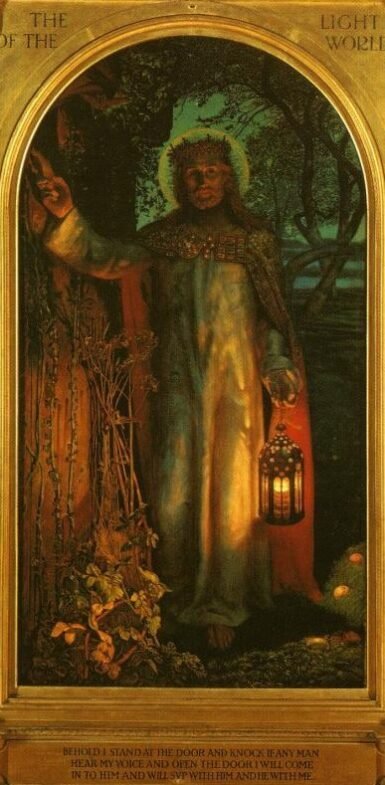“Behold, I stand at the door, and knock: if any man hear my voice, and open the door, I will come in to him, and will sup with him, and he with me”
Behold
Means pay attention, this is a key and important verse. So, it can be used to resolve any ambiguity for other verses.
I stand at the door, and knock
That door is the door to our hearts. Jesus is not silent or absent, he is waiting with us, and actively calling us to open that door.
The picture here is the door is closed; our worldly experience can produce resentment and the illusion of self-reliance, we become jaded, and we tend to close that door.
This verse pictures Jesus as the polite guest who doesn’t barge in against our will, he considers and abides by our wishes.
I will come in to him, and will sup with him, and he with me
Jesus promises to enter into our lives.
This symbol of sharing a meal is used throughout the bible, and it symbolises many things:
- Acceptance and fellowship, unity, peace, forgiveness, reconciliation, restoration of the relationship intended for us with God;
- God’s presence and provision, and our spiritual sustenance, with Jesus as the “bread of life”;
The phrase “sup with him, and he with me”, shows this is a meal between equals, that Jesus accepts us as brothers and sisters in the family.
If any man hear my voice, and open the door
This is an amazing promise, for it is given to everyone who will hear Jesus’ call to us, and allow him into their lives, and that is contrary to the human way of thinking.
I have known people who continue to believe they cannot truly be forgiven for what they have done in the past, and others who believe life’s course cannot be changed.
And the human way of thinking is recorded in early Greek philosophy and myths, according to which we are ruled by our destiny, as determined by the Fates, and nothing we do can change that, and this thinking was continued in later Stoic philosophy.
And that same human way of thinking extends across the world to other cultures.
In the film Lawrence of Arabia, the story is told of the Appointment in Samarra, where a man flees on horse from Bagdad after meeting death, only to find death in Samarra, where Death had expected him to be. This Fatalist thought leads to a sense of futility, we give up trying.
And the view that our past prevents us from being accepted by God was well represented by the legalistic Pharisees of Jesus’ day.
So, this promise by Jesus breaks through our limited human thinking that leads to futility. The power of the miracle of his sacrifice on the cross is far greater than that of sin and Satan and death; no person can sink so deep as to be beyond the reach of Jesus. The only barrier which prevents them from being saved by Jesus is their own self-will, their refusal to allow Him to take control of their lives through his Holy Spirit.
And this has a wonderful consequence — it means we can be assured of our salvation in Jesus.
As well as being a turning point in our lives, this is a daily experience, a choice to spend life each day with Jesus, or on our own.
When we hear the call by Jesus above the noise of this world, and respond, it is life-saving and life-transforming.
And it has been for me, and is each day.

0 Comments